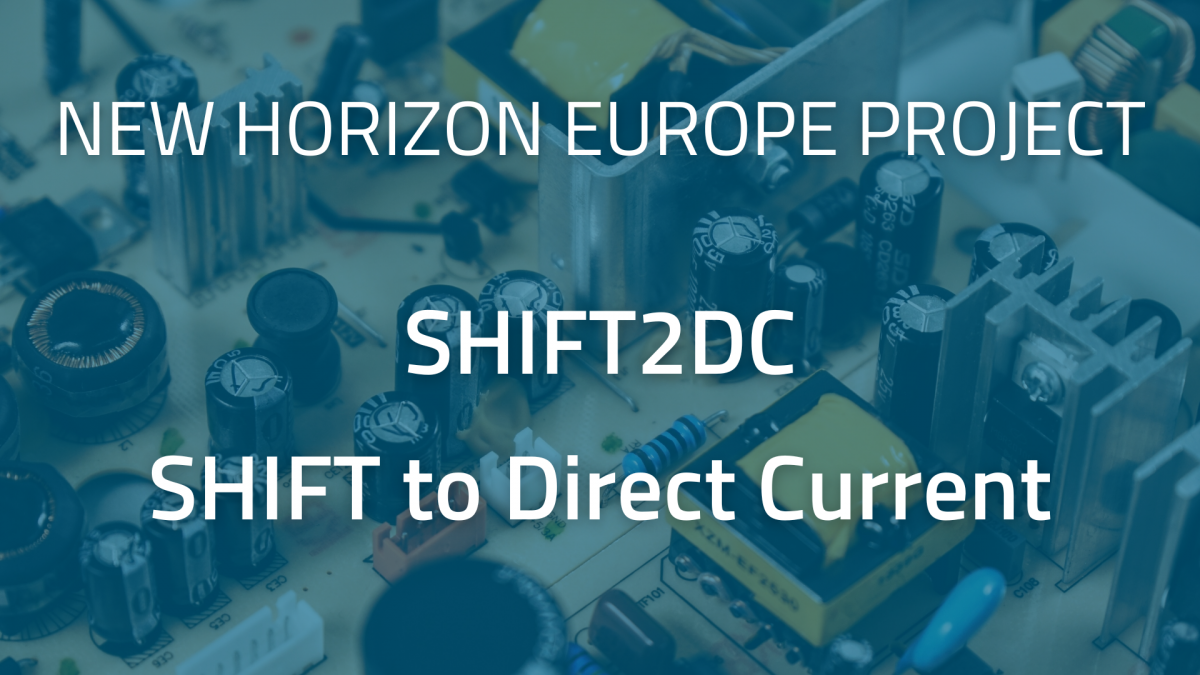
SHIFT2DC: Should the Energy Transition be made in DC?
Picture a future where electricity is not only reliable and affordable but also environmentally friendly and adaptable to our changing needs. This vision is at the heart of the SHIFT to Direct Current (SHIFT2DC) project, a transformative initiative that aims to revolutionize the way we design, implement, and benefit from direct current (DC) solutions in our power systems.
Running for 42 months and funded with a total close to 9 million € by the Horizon Europe Innovation Action Programme (900K€ of which will fund participation by INESC-ID), and bringing together a group of 28 partners*, SHIFT2DC is a forward-thinking collaboration that seeks to explore and promote the use of DC solutions at both medium and low voltage levels. The goal is to unlock the full potential of DC power, which offers numerous advantages, including greater energy efficiency, reduced transmission losses, and better integration with renewable energy sources.
The consortium also has as associated partners a certification laboratory (Laboratoire National de Metrologie et D´Essais; LNE, France), a system operator (Empresa de Electricidade da Madeira, SA; EEM, Portugal) that will collaborate in the port demonstrator, an engineering office (SETEC BATIMENT, France) that will test the DC design tools, and the two most important DC promotors namely, Stichting Current OS (Netherlands) and ODCA (represented in the project by ZVEI e.v., Germany, since is not yet an independent party).
One of the key aspects of the SHIFT2DC project is conducting in-depth analyses and real-world tests to ensure that the proposed DC solutions are not only feasible and cost-effective but also environmentally sustainable. By carefully examining factors such as life cycle impact and energy efficiency, the project aims to develop smart and scalable DC solutions that can meet the diverse energy needs of our society.
Beyond just developing new technologies, SHIFT2DC is committed to making the adoption of DC solutions easier for everyone. To achieve this, the project is developing user-friendly tools that will help planners, engineers, and decision-makers design, simulate, and assess the effectiveness of DC systems in various applications. These tools will empower communities, businesses, and industries to embrace greener energy alternatives seamlessly.
One of the most exciting prospects of SHIFT2DC is the potential to create a new energy landscape that prioritizes sustainability without sacrificing reliability. By optimizing the use of DC power, we can build resilient microgrids, power our homes and businesses more efficiently, and reduce our overall carbon footprint. Furthermore, the project’s dedication to interoperability, scalability, and security ensures that the proposed solutions will be future-proof and adaptable to evolving energy demands.
As the SHIFT2DC project continues to unfold, it holds the promise of transforming how we generate, distribute, and consume electricity. Through innovation, collaboration, and a commitment to a cleaner energy future, SHIFT2DC is setting the stage for a world where greener and smarter energy solutions benefit both people and the planet alike.
*The full list of partners includes:
- INESC ID – Instituto de Engenharia de Sistemas e Computadores, Investigação e Desenvolvimento em Lisboa (Portugal)
- Électricité de France (France)
- CNET Centre For New Energy Technologies SA (Portugal)
- Fundacion Tecnalia Research & Innovation (Spain)
- Rheinisch-Westfaelische Technische Hochschule Aachen (RWTH Aachen) (Germany)
- Fraunhofer Gesellschaft zur Forderung der Angewandten Forschung EV (Germany)
- Schneider Electric Industries SAS (France)
- DC-Systems B.V. (Netherlands)
- Nexans France (France)
- Nexans Sweden (Sweden)
- Fundacion Circe Centro de Investigacion de recursos Y Consumos Energeticos (Spain)
- Watt & Well (France)
- Tallinna Tehnikaülikool (Estonia)
- Bachmann GmbH (Germany)
- Hiro Microdatacenters B.V. (Netherlands)
- Eaton Industries GmbH (Germany)
- Eaton Elektrotechnika SRO (Czech Republic)
- Eaton Industries (Austria) GmbH (Austria)
- Hitachi Energy Spain SAU (Spain)
- Phoenix Contact Electronics GmbH (Germany)
- Phoenix Contact Power Supplies GmbH (Germany)
- Phoenix Contact GmbH & Co. KG (Germany)
- APRAM – Administração dos Portos da Região Autónoma da Madeira, SA (Portugal)
- IST-ID Associação do Instituto Superior Técnico para a Investigação e Desenvolvimento (Portugal)
- JJ Cooling Innovation Sàrl (Switzerland)
- PCB Design Kutato ES Fejleszto Korlatolt Felelossegu Tarsasag (Hungary)
- European Heat Pump Association (Belgium)
- Fincantieri SI SPA (Italy)
